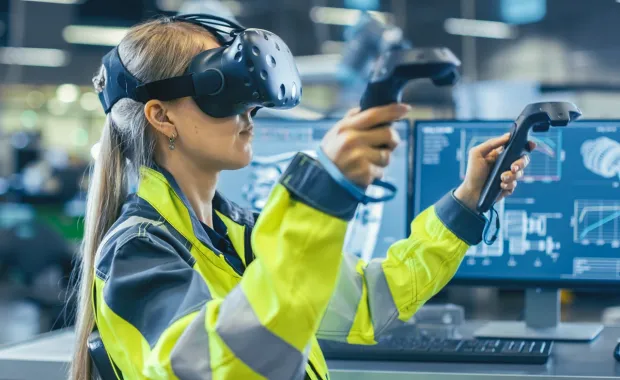Manufacturing is the backbone of the global economy, playing a vital role in our daily lives, from mining the metals used in our phones to designing self-driving cars. As the world rapidly evolves, we are witnessing a period of significant technological innovation, likely only rivaled in our lifetimes by the early days of the Internet. We’re also witnessing a time of immense geopolitical instability and a shift in the world economic order that is forcing organizations to fundamentally rethink how they do business.
For manufacturers, this era offers the potential for a complete metamorphosis of business and operating models.
Traditionally, the manufacturing sector has been cautious about adopting changes, be it introducing new technologies or changing how their operations are run. However, the industry also recognizes that new technologies offer substantial cost benefits and can drive major strategic innovations.
The manufacturing industry is adapting to—and taking advantage of—these changes, as evidenced by CGI’s annual global proprietary research. Unlike other industries with more uniform responses, manufacturing leaders’ responses related to technology strategy and adoption, supply chain, and other priorities are as varied as the industry’s work.
Modernization presents great opportunities and challenges
Manufacturing is a well-established industry simultaneously slow-moving yet willing to take calculated risks to gain a competitive edge. This duality can be seen as conflicting but, in reality, is complementary.
Cutting-edge innovators risk implementing trends that may not pay off in the future, and slower-to-change manufacturers must explore new ways to do business or risk being left behind. This means that every manufacturer will have different needs, goals, timelines, and priorities. Some may need help modernizing decades-old operations via tools like machine learning algorithms and automation. Others may be anxious to adopt the “latest and greatest” technologies to improve operations or secure a market advantage.
All organizations need trusted advisors who can provide actionable insights that generate tangible outcomes.
Growing need for diversification and supply chain ecosystems
Today, the manufacturing industry must carefully balance modernization efforts with navigating geopolitical instability, which has contributed to an economic slowdown globally.
One measure to cope with this slowdown is to focus on diversification, which requires investment and cost-cutting to keep liquidity balanced.
Diversification calls for exploring new product lines, offering value-added services and expanding to new geographies. However, to successfully drive growth through diversification, manufacturers need comprehensive data insights across their operating units. These insights are crucial for supporting product innovation, developing new service offerings, and forming partnerships with other market players.
A second consequence of geopolitical instability is the enhanced need for defense production. It is prompting some manufacturers to support critical defence partnerships, such as the North Atlantic Treaty Organization (NATO), and to collaborate more closely with public and private sectors through highly integrated ecosystems.
Both speak strongly to the need for resilient and flexible supply chain ecosystems that can adapt to unpredictable world events to mitigate risks, navigate disruption, maintain business continuity, and better serve the needs of customers and citizens.
Manufacturers leverage AI to thrive in a competitive, volatile environment
CGI’s research shows that artificial intelligence (AI) is one of the most impactful priorities across all industries this year, including manufacturing.
More and more, manufacturers are assessing how best to use traditional and generative AI (GenAI) to improve business processes and operations, including reducing costs and exploring new revenue opportunities to strengthen their market position.
Some of the AI use cases manufacturers cite in CGI’s research include:
-
Improving real-time decision-making (69%);
-
Using AI tools to better assess and find talent (66%); and
-
Contributing to sustainability efforts and reducing emissions (56%).
Whether for optimizing shipping routes to lower emissions, reducing product development cycles or improving assembly line operations, manufacturers are turning to AI to assist with tasks previously too complicated to address manually.
Effective collaboration between IT and business units will be key to leveraging AI to enhance both efficiency and operations. IT efforts are geared toward streamlining and consolidating IT systems to improve financial flexibility, increase agility, and support ongoing digital transformation projects—all while ensuring security is embedded throughout.
It’s also important to recognize that AI is only as good as the data it is trained on. Proper implementation that yields the best results must be firmly grounded in a comprehensive data strategy and the right skillsets and culture.
Finally, realizing the true benefits of AI will require a responsible approach that leverages the best practices and ethical principles of scientific research, provides clear and enforceable guidelines, and includes a robust risk matrix.
Practical next steps for manufacturers
For manufacturers, success lies in preparing for an unpredictable future, intelligently adopting new technologies to improve operations, and preparing for supply chain disruptions. As industry leaders look ahead, here are some aspects they can keep in mind as they navigate this time of development and growth.
- Identify areas to increase cost efficiencies while seeking new revenue streams, either geographically or via new technologies.
- Research investments in smart, innovative technologies for better operational insights and the ability to leverage data.
- Revamp and optimize IT infrastructure to support agility and innovation.
- Seamlessly integrate cutting-edge security measures to harden defenses against cyberattacks.
- Craft a dynamic data management strategy and governance practice to fully and responsibly leverage AI capabilities.
For more on CGI’s annual proprietary research, visit the 2024 Voice of Our Clients manufacturing insights.





